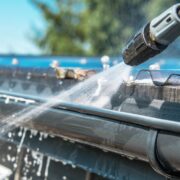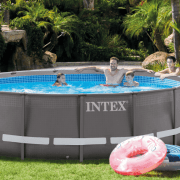Working out and exercises are vital for a fit body. Going to the gym releases stress and uplifts the mood.
Physical exercises are different for everybody. Some prefer lifting weights, while others choose running or join a yoga class.
When you push your body to become better, it starts a regeneration process, resulting in stressing the muscles.
Whether you are a beginner or used to sore muscles, knowing a way to heal them will interest you. So, is a hot tub after work out a good option? Read further to find out.
You probably already know that soaking in a hot tub helps to heal sore muscles. Especially if you are an athlete, it is easy to overwork yourself.
Immersing yourself in a friendly, warm hot tub after a workout can help to a great extent.
Benefits of a Hot Tub after Workout

Muscle Ache Relief
When you take a hot tub after a workout, your tensed muscles relax as blood vessels expand. After high-intensity training, muscles turn stiff, and a warm treatment helps relieve the muscle ache due to stiffness. Your muscles tend to tense up, which causes pain. Even if you don’t overwork yourself, the ache may be due to the muscles’ tension.
Also, it’ll always be a great idea to massage your muscles post every workout and hot tub. Using a massage gun to massage your muscles after every workout makes sure that your tensed muscles are free and relaxed and you’ll be safe from any possible injury issues including muscle soreness, fatigue or even muscle damage as well. A good example of a massage gun is deep muscle massager. Exogun is a deep muscle massager that penetrates deep in the muscle tissues and revives your muscles, boosts circulation and helps you recover faster and live better. Trusted by pros, Exogun delivers ultimate recovery.
Relaxing the Mind
It cannot be denied that workouts are stressful. And if you are competing in a sports championship, the stress can be even more. You might also struggle to cheer up after a game that you lose that ruin your next performance. Generally speaking, we humans are always stressed.
Imagine yourself inside a hot tub, fully immersed, enjoying the experience. There is something innately soothing about hot water. A right hot tub after a workout can give you the time of your life.
Managing Energy Levels
There will be days when you will fail to summon the strength for working out. All of us experience lulls. This may also be due to low blood pressure. After a workout for five/six days a week, thirty minutes of a hot tub can do wonders. Hot water helps in managing blood sugar levels and hence your energy.
Before soaking yourself in a hot tub after a workout, make sure you eat something. Soaking immediately after a workout may wear you out and complicate your blood sugar.
Sleep Regulation
If you have trouble sleeping or insomnia, a hot tub can be fantastic if you work out at night. Studies have proved that a hot water bath help in a sound, deep, and restful sleep. It eases the blood circulation and relaxes the muscles. The improved sleep will also help in the faster recovery of muscles.
Learning Heat Adaptation
A hot tub after a workout enhances the body’s ability to cool itself by sweating more and faster. Your core temperature will also be lower while you exercise and rest. A hot tub treatment also results in increasing the volume of blood plasma, which is an indication of a healthy heart.
Promotes Focus
Soaking in a hot tub after a workout helps slow down and better awareness of the body. It also helps in reducing anxiety and improving concentration. We invite a lot of distractions with stress and anxiety. A hot water bath feeds the focus and limits these distractions.
Helps in Weight Loss (Calorie Burn)
A hot tub after a workout is a passive exercise. Even while your body is at rest, warm water accelerates calorie burn. If physical exercise is too intense for your joints, water-resistance combined with a low-impact exercise opportunity can be excellent.
Hot Tub vs. Cold Water
I am sure you must be thinking that we apply an ice pack on the injured area every time we feel sore or hurt ourselves.
Then why are we talking about a hot tub here? Coldwater therapy is useful for inflammation. This is because the muscle tissues get inflamed, and the inflammation reduces at a cold temperature, taking away the pain.
Warm water helps after a workout as it helps with the soreness. You don’t get inflammation after working out, do you?
If you work out regularly, here are some Do’s and Don’ts
DO’s and DON’Ts While Soaking in a Hot Tub

There are many types of hot tubs available in the market. Physical body stress during exercise can cause dehydration. It will help if you drink plenty of water while exercising. Hydration is essential to keep the body going.
When you get inside the hot tub, make sure you have a bottle of water with you. Why? Because just like exercising or working out, a hot tub will make you sweat.
Do not soak yourself in the tub immediately after your workout. Give your body a little bit of time to cool down. If you don’t give a pause in between, it can be dangerous for your body. After working out, the body has a high temperature and stiff muscles.
The heart rate is also high. Warm water can cause you further muscle tension instead of making you feel relaxed.
If you decide to buy a tub, do not buy the one that offers intense massages. High pressure might make muscles tense, so you should be sticking with a moderate massage setting. Your muscles will still be recovering, and just a light, a warm bubble bath is enough.
What Time is the Best for Soaking?
As mentioned earlier, warm water therapy increases blood flow, stimulates healing, and relaxes muscles. A hot tub after or before a workout? Let’s find out.
Before Workout
A hot tub soak increases blood circulation. So, taking a short therapy before going to the gym or exercising can help loosen the muscles and get the blood flowing well. A 10-20-minute session should be enough.
Before getting out, stretch your muscles a bit so that the body gets all warmed up. Studies have proved that taking a hot water bath before a workout can increase performance as muscles open up. Loosened muscles also prevent injury. Don’t be surprised if you can do more squats or a perfect split.
Immediately After Exercise
It is not a good idea. Plan to soak in your hot tub after a workout only when your heart rate returns to normal and muscles cool down. The hot tub will make you sweat when you are already dehydrated. This will delay your recovery process. Take some time, maybe a day or two, and allow your muscles to recover and stabilize.
Hot Tub Hours After Workout
This is the time when the therapy will yield the most significant benefit. You will start feeling better, relaxed, and calm. Your muscles will heal and loosen up. The increased blood flow would help in muscle recovery. You have to sit back, play soothing music, get a drink, and relax. Your body deserves it.
Hot Tub after Workout: Final Thoughts
Irrespective of the time you choose to soak (before, after, or both), a hot tub is of great use, especially if incorporated into a regular training schedule.
If you decide to add a hot tub after a workout, start with a short soak to allow your body to adjust and never forget hydrating it.
There are some side effects of overheating, like nausea, light-headedness, and dizziness. Do not overlook these and push yourself too hard.
Everybody is different. Pay attention to how your body reacts to hot tub therapy. Hot tubs can be your best friends and if you can invest extra bucks, pamper yourself with a luxury hot tub. Try them out!














Comments